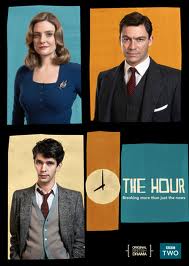Wednesday, 27 July 2011
The Hour
The BBC's new drama The Hour is now two episodes in. If you tuned in expecting to see a British Mad Men you'll have been disappointed. It may be a period drama from the 50's - where Mad Men began but that's about all they share in common. With the words Mad Men being printed in every article I read about The Hour, plus the whiff of Mad Men about the BBC trailers was there ever a worse case of wrongly positioning the audience? Look at the picture above - it shouts Mad Men and yet...it is not representative of any graphics in the show.
As someone who loves what Mad Men does the last thing I want to watch is a pale imitation. But as a writer I know that the intention behind this series was never to ape its American cousin. The Hour, we are told, attempts to look at the birth of news as we know it on the BBC, set against the Suez crisis and a Hitchcockian subplot - which I fancy will become the main plot. I came away from the first episode thinking - what this really wants to be is a thriller - and I hadn't been expecting that.
The problem is, once you begin the comparisons between the two series its hard to watch The Hour without thinking of Don Draper and the men and women of Sterling Cooper. There are lots of areas where the American series scores home runs whilst the British series gets a golden duck. Particularly in the way the two shows treat race and gender politics. Mad Men shows it as it was, many of the perfectly nice white people are racist, men don't treat women well, everybody smokes. We are left to tut and shake our heads at home. We are better. We have grown up.
In The Hour contemporary race and gender politics are transported backwards to 1956 and bolted on to characters. They constantly tell us that women are powerful enough to run a TV show and that white people shouldn't turn black people away from jobs or boarding houses. They tell us what we should be thinking. They hammer it home with a bloody mallet.
In making the young producer of the BBC's new flagship current affairs a 28 year old woman they've flown in the face of truth. Women just didn't get those jobs then, ask Esther Rantzen who started as a BBC secretary in the late sixties and rose through the ranks to become an Executive Producer and one of the most f. A show like The Hour doesn't need to rewrite history. You can make your points, you can create female characters with inner strength and brains and dynamism without distorting the past famous faces on BBC television. She wouldn't have got a look in in 1956.
The real woman who rose through the ranks and became a legend at the BBC was Grace Wyndham Goldie who pioneered the coverage of politics and current affairs on television, and established programmes such as Panorama, Tonight, That Was The Week That Was and The Money Programme. But she wasn't a producer at 28. Her 'boys' were some of the best known figures in 20th century broadcasting in the UK; Cliff Michelmore, Huw Weldon, Alasdair Milne and Richard Dimbleby.
Dimbleby was a giant broadcasting. He fronted the flagship Panorama show from 1955 - the show I presume The Hour is supposed to be based on. Dimbleby was heavyweight, The Hour's Hector Madden is more like the William Hurt's anchor in Broadcast News, a pretty boy, good with autocue. But like the decision to make the producer a 28 year-old woman, the decision to 'build The Hour' around the personality of Madden rings false. It was the issues not the personality that were important at that time. The cult of celebrity was way in the future. There was no big picture of Richard Dimbleby hanging behind the presenter's desk.
All these niggling details serve to irritate, like the Birds Custard sitting in a cupboard next to the Brillo Pads. I understand now why Matthew Weiner has made it his life's work to go over EVER detail of his show. You might have an authentic box of pan scourers but they live UNDER THE SINK. Mad Men would never make a mistake like that.
The cleverness of Mad Men is how they use the events of an era and show how they change the people at Sterling Cooper and how those changes reflect in their work. The Hour had the potential to chart the way reporting changed in the 1950's against the backdrop of Suez and a society that was changing in the way it thought about immigrants, woman and the working classes. It's making hard work of it.
Subscribe to:
Post Comments (Atom)


No comments:
Post a Comment